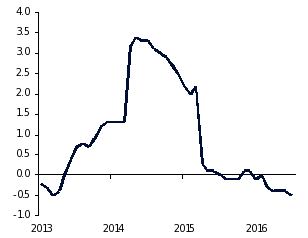Economic Commentary
On 21 September, the Bank of Japan (BoJ) decided to augment its existing “Quantitative and Qualitative Monetary Easing” policy with a new one called “Yield Curve Control”. Central banks have traditionally conducted monetary policy by controlling short-term interest rates, reducing them when the economy is stuttering and increasing them when the economy is over-heating. The new BoJ policy represents an innovation as it aims to control long-term interest rates in addition to short-term rates. Despite the innovative move, the policy is unlikely to provide a significant boost to the Japanese economy or lift its nose-diving inflation rate. For that, fiscal policy could be a more potent tool.
The BoJ took four measures in its meeting on 21 September. First, it decided to keep the short-term policy rate unchanged at -0.1%. Second, it promised to keep 10-year bond yields at around the current level of 0%. Third, it will continue purchasing about 80 trillion yen of Japanese government bonds per year, which it judges to be sufficient to keep long-term rates at zero. Fourth, it promised to continue its purchases until core inflation overshoots the 2% target for a sustainable period of time.
Why did the BoJact in such an unorthodox way? Recent data from Japan have shown activity slowing. Real GDP growth was only 0.7% in the second quarter. More importantly, deflation has set in again with core inflation touching -0.5% in July. Surveys of inflation expectations suggest that the downward trend in prices is likely to continue. The latest figures show that 27% of Japanese households expect prices not to rise compared with 18% a year earlier. Furthermore, attempts by the BoJ to stimulate the economy by introducing negative interest rates have backfired. Negative rates have hurt commercial banks’ profitability and made them more reluctant to lend.This has been an important factor behind the recent weakening of data.
Japan core inflation (excluding fresh food) (year-on-year % change)

Sources: Ministry of Internal Affairs and Communications, Haver Analytics and QNB Economics
Will the new BoJ policies succeed in boosting growth and lifting inflation? We are doubtful. The BoJ’s promise to overshoot its inflation target is not credible given that it has not even succeeded in shooting inflation to its 2% target beyond the brief period in which the increase in consumption tax lifted prices. Markets are also sceptical about the new policy package. The yen whipsawed following the BoJ announcement – initially weakening before strengthening against the US dollar. And although Japanese equities have risen by around 3%, this was probably more due to the BoJ inaction of not lowering short-term rates deeper into the negative territory (which would have hurt banks) rather than its action on the other fronts.
More broadly, we believe that monetary policy has probably reached its limit in Japan. New monetary measures which reduce rates by a few basis points here or there represent little beyond fiddling on the margin.
However, there is ample policy space on the fiscal side to stimulate the economy. For Abenomics to get back on track and achieve its ambitious target to get Japan out of deflation, fiscal policy needs to play a more active role. The BoJ’spromise to keep 10-year yields at around 0% should provide the government with incentive to spend and invest. The government is taking steps towards that end having recently announced a fiscal stimulus package. Given that parts of the world, notably the Euro Area, are following the Japanese path towards deflation, the policy experiments in Japan could provide key lessons for all to learn from.
Disclaimer and Copyright Notice: QNB Group accepts no liability whatsoever for any direct or indirect losses arising from use of this report. Where an opinion is expressed, unless otherwise provided, it is that of the analyst or author only. Any investment decision should depend on the individual circumstances of the investor and be based on specifically engaged investment advice. The report is distributed on a complimentary basis. It may not be reproduced in whole or in part without permission from QNB Group.
